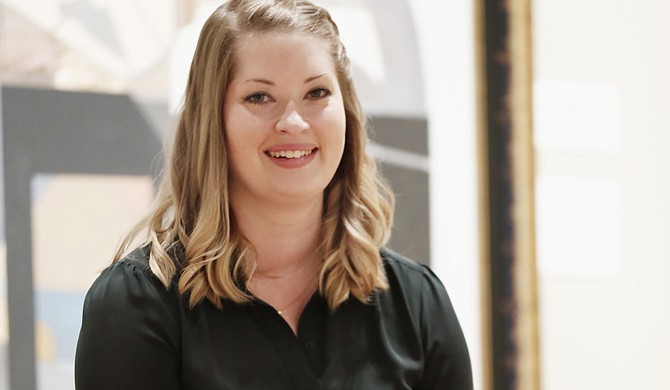Photo by Imani Khayyam.
The promise of never-ending paperwork didn't scare off Caitlin Podas, the registrar for the Mississippi Museum of Art. The Orange, Calif., native has pursued a career in museum registration for most of her adult life, though her attraction to the field isn't about administration.
Podas says that even though registration involves a lot of paperwork, she likes the hands-on aspect. "I get to be in the vault and behind the scenes, and I get to touch all the stuff that nobody else gets to," she says. "... I like to be the one who gets to hold that in their hands and not just look at it on a wall."
While attending Colorado State University, Podas began working at the Fort Collins Museum of Discovery during semesters and at the Newport Harbor Nautical Museum and the Nixon Presidential Library and Museum during her summers. But her career trajectory changed when she took a year off from school to intern at the Denver Art Museum after graduating from CSU with a bachelor's degree in history in 2008. She decided that she wanted to continue working in art museums and began including art in her studies.
"When I went to grad school (at the University of South Carolina), I made a very conscious effort to incorporate art as much as I could into my curriculum and did all of my internships at art museums," Podas says. "I had a work-study position when I was a grad student and requested that most of what I did was art-related. I tried to do all those things to get where I wanted to be, which was a registrar at an art museum."
After graduating with a master's degree in public history in May 2012, she moved to Jackson to work at the Mississippi Agriculture and Forestry Museum that November. Then, in 2014, Podas accepted her position at MMA, where she takes care of the museum's 5,600-item permanent collection. She also handles all loans and exhibitions that come through, which means arranging the shipments, acclimating pieces to the museum's environment and preparing detailed reports of the works' condition after transit.
"I think (people misunderstand) how much time and energy goes into arranging all of that for an exhibition," she says. "It takes a long time and a lot of planning from beginning to end, before the show can even open."
In the end, Podas says the work pays off because she's able to deliver great experiences like she's had in museums over the years.
"Being a part of that growing up has really informed who I am, and I can pinpoint a lot of my interests to museum visits," she says.
"I'd like to be a part of that in other people's lives, making a difference in how they build their career or their interests."


